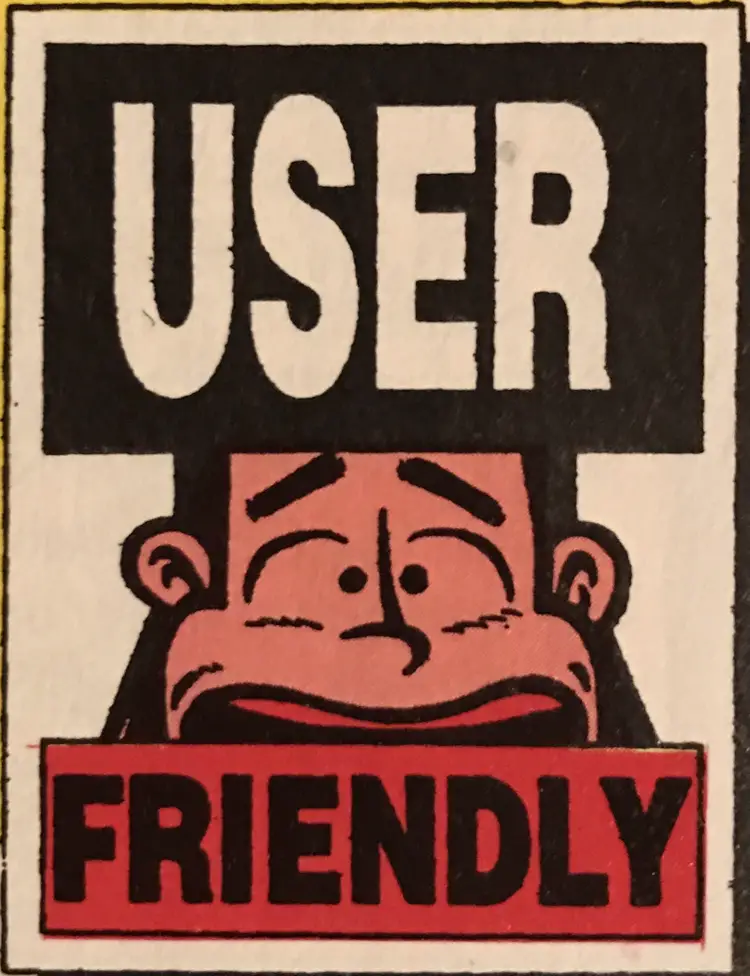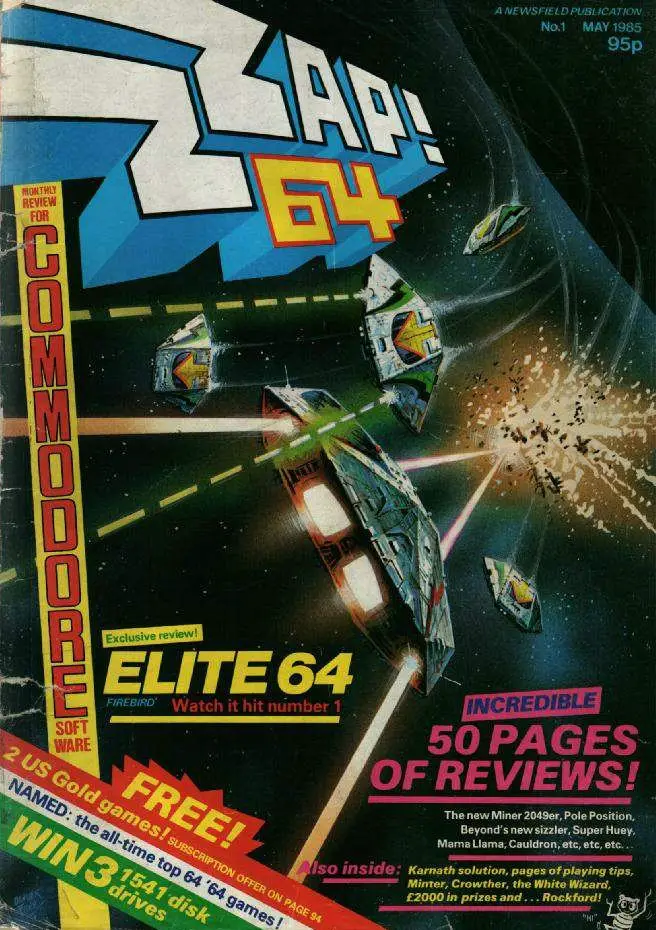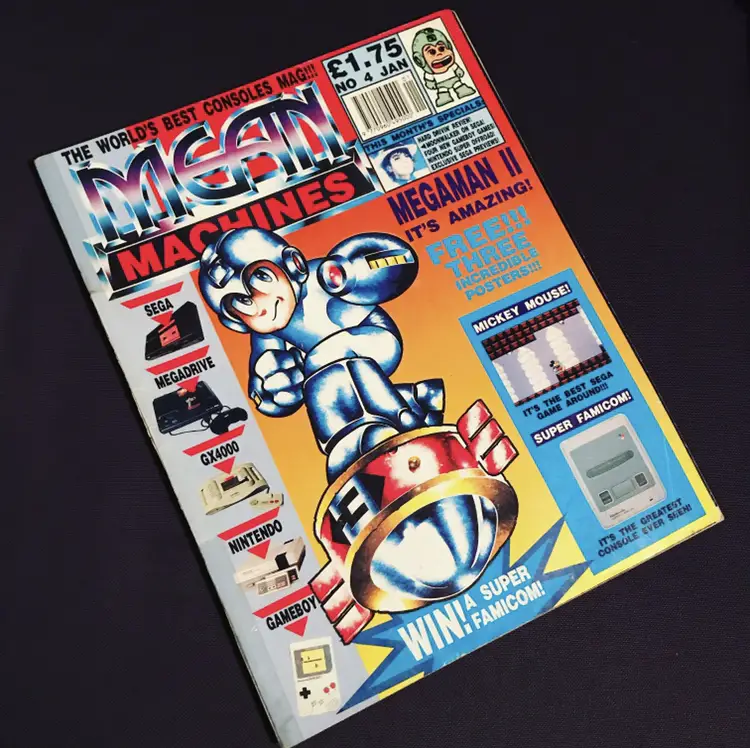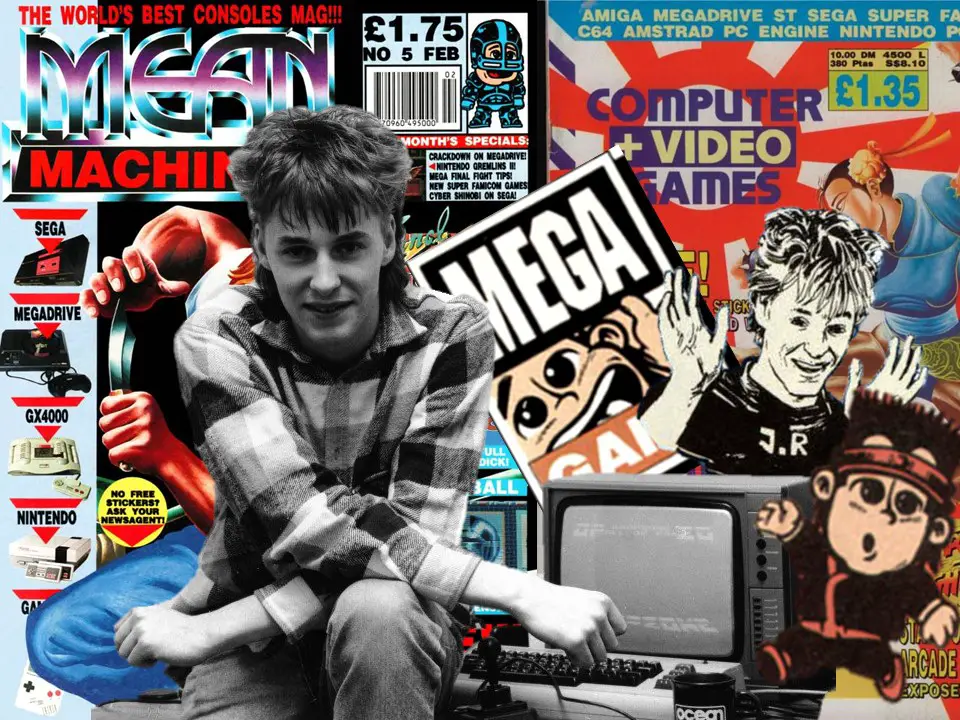Julian ‘Jaz’ Rignall is a true legend in the world of Gaming Journalism having worked on such legendary publications as ZZap 64, Computer and Video Games. He was also responsible for bringing us Mean Machines Magazine in the early 1990’s.
Mean Machines which would go on to split into two magazines (Mean Machines Sega and Nintendo Magazine System).
Julian ‘Jaz’ Rignall Started out as a successful competitive gamer that opened doors into gaming journalism. Jaz’s career has been a long and successful one. I think it is fair to say that Jaz has a lot of fans within the retro gaming community (especially in the UK).
In the early 1990’s when I was a teenager I dreamt of being able to write for a magazine like Mean Machines or CVG, it was a dream job that in all honestly has led me to starting this site. So when I was thinking of who I would like to interview for my website Julian ‘Jaz’ Rignall was top of the list.
It was a little scary coming up with questions for somebody that I respect so much but I did manage to cobble together some questions and Jaz has kindly provided some really insightful answers which I hope you enjoy reading as much as I have.
More Gaming Memories:
- Mean Machines – 90s Gaming Magazine
- When Consoles Took Over Gaming
- 80s and 90s Pocket Money Memories

Julian ‘Jaz’ Rignall Interview
As a kid I only ever got to play arcades when we went to the coast. Did you have a favourite arcade in the early days, a local place to play?
I grew up near the small seaside town of Aberystwyth on the west coast of Wales. It had a couple of fairly sizeable arcades—the King’s Hall, and the Royal Pier. The latter was my favourite place to hang out, since it featured a really comprehensive selection of arcade machines. It also had a nightclub attached to it, which meant that at weekends it stayed open until really late—which was perfect for when I was going for record scores on games like Defender and Asteroids. I’d turn up first thing in the morning and the cleaners would let me into the place early so I could start playing, and then I’d continue through the day and well into the night on a single credit. That meant pretty much 18 hours of non-stop play on a good day, which was why I was able to achieve some monster high scores.

What was your first experience of competitive gaming?
I was pretty lucky, really. My favourite arcade—the Royal Pier—was very popular with the local school kids and university students, and there were a lot of very good players who were regulars. We would often swap tips or just watch each other play so we could learn from one another, and that led to a fiercely competitive environment. We were all feeding off each other and constantly going for top scores, and that really drove the quality of play through the roof. It was that setting that enabled me to seriously develop my arcade skills and produce the kind of high scores that let me qualify for, and eventually win the National Arcade Championships in 1983.
You started your career as a games journalist back in the early 1980’s. Did you think back then when you were very successful as a gamer and starting out that you could carve out such a long career in the gaming industry?
I was just amazed that I was being paid to write about games for a living. Still am, in many respects. I’ve always loved video games, and being able talk about them professionally in any capacity is something that I’m eternally grateful for.
When I look back to the 1980s and the early 1990’s the Commodore 64 seemed to be around for what seemed like a lifetime. When Zzap 64 launched was there any discussions on what the lifespan of the system might be or if the magazine would ever need to adapt?

Not in the early days. We were just really excited to be writing about what we all believed was the greatest computer of the era—the Commodore 64. At the time that ZZAP! 64 launched, the C64 was still relatively new and there was a ton of new games being released for it every month, so we didn’t really think about its long-term future.
It was only three or so years later when the Amiga began to grow in popularity that we really started to think about the future of ZZAP! 64 and how long the C64 might last. In an attempt to give the magazine some legs, we decided to offer some basic editorial coverage of the Amiga in ZZAP! 64, but unfortunately our efforts received a seriously mixed reaction.
Some readers really wanted to read about the emerging new 16-bit computer, while others absolutely hated the idea of us covering it. That rift in the readership made it really challenging to talk about the Amiga properly, and as a consequence our coverage of the system always felt like a bit of an afterthought—which was definitely not good for the long-term health of the magazine.
Do you ever get the opportunity to try any of the new games that are still being produced for the Commodore 64 or any other retro system?
I played a bunch of new C64 games so I could review them for the recent ZZAP! 64 Annual and enjoyed many of them—especially Commando, Luftrausers, and Berzerk—but to be honest, I don’t play new C64 games as much as I’d like.
I’ve always been really obsessed with the latest games, so I tend to sink my gaming time into titles like Red Dead Redemption 2, Forza Horizon 4, Spider-Man, Destiny 2, and so on. That’s not to say I’m averse to modern retro games—there are some great ones out there for sure—it’s just that my interest is more drawn towards playing the latest games on the newest technology. I’ve always been that way.
Computer and Video Games was the first magazine that I purchased every month. I didn’t start buying it until I was 11 (in 1989) but at that time there seemed to be so much stuff to cover with existing systems and what was going to be coming to the UK. Was it ever a struggle to find the right balance with regards to content for the magazine?
The very late 80s was an absolutely amazing time to be writing about hardware and software—it’s one of the greatest eras in video gaming history! There was just so much going on. The 8-bit micros were still going strong, the emerging 16-bit computers were finally beginning to take off, and then, of course, the 8-bit consoles were gaining in popularity every month, and on the horizon were the super-exciting 16-bit consoles.
It was incredibly difficult to balance the editorial in CVG, so in the end we just wrote about whatever were the most exciting topics of the month. Sometimes that might be a really cool 16-bit computer game like Starglider, a notable licensed game on 8-bit micros like Robocop, or a multi-page feature on Japan’s coolest consoles. I think that made for a really exciting magazine—you might not always know what to expect, but whatever it was we were writing about, it was seriously hot stuff!

Also, is it true that when you started with CVG that there wasn’t a single word processor in the building?
CVG was seriously old-school when I first arrived there. We used typewriters to write our stories, and then we’d take the pieces of paper to a typesetter, who would turn it into copy galleys that would literally be pasted onto the page layouts of the magazine with glue. It was truly archaic. I’d previously worked at Newsfield, where we used word processors and sent text files directly to the typesetters, so it really felt like a step back when I arrived at CVG and realized they were still doing things the old-fashioned way. Fortunately it didn’t take too long to get that all changed. Once the Publisher of the magazine saw how much time and money he could save by buying us word processors, he couldn’t give them to us fast enough.
What was your first experience of a 16-bit console?
That would be the Sega Mega Drive. Its arrival at the CVG offices was a major event, and I remember being incredibly excited when I opened up the box and plugged the console into our trusty NTSC TV. We’d seen pictures of the system and its games in various Japanese magazines for months beforehand, and we just couldn’t wait to get our hands on them. Fortunately, we weren’t disappointed. The arcade conversions were top-notch, and most of the original games were all very good. It was clear that this was a seriously good machine, and we were all very excited about it, as our hype-ridden editorial coverage subsequently attested.
I am a self-confessed Mean Machines fan who absolutely adored the magazine. Was it as much fun producing it as it came across to the reader?
It was a lot of very hard work and required many late nights, but we loved producing Mean Machines and had a huge amount of fun doing so. The team really worked well together, and we all had a tremendous passion for games that I think shone through in the way we wrote about them. What also bled into the magazine was the back-and-forth banter that the team had—we were constantly ribbing each other and taking the piss—much of which made it straight into the magazine. We were always trying to one-up each other’s jokes and looking to find ever-more-amusing ways of trashing bad games, and that also contributed to the magazine’s pretty crazy sense of humour. What you read in the magazine totally reflected our office life.

As Julian ‘Jaz’ Rignall was the man behind the magazine, you can find my Mean Machine Magazine Memories here.
From what I have read it wasn’t an easy sell to get it Mean Machines off the ground. Did it not seem obvious at the time to the people making the financial decisions that there was room for a console only magazine?
Initially, it was a hard sell. I banged on about making a console magazine for what felt like months before CVG’s publisher finally went for it, though in retrospect I think we published it at just the right time to catch the wave of popularity that helped drive consoles to great success in the early 90s. We actually started making Mean Machines issue zero—the test edition of the magazine—over the summer of 1990 and received a lot of good feedback about it. That ensured it got the green light, and it became a real magazine that autumn. There was just enough of an ad market to support those early issues, and by the time we hit issue five the magazine was selling out its entire print run every month, which helped make it incredibly profitable and successful.
On early issues of Mean Machines, the Amstrad GX4000 was featured on the front cover. Did you think back then that it could make an impact in the console market?
Nope. It seemed rather obvious to me that it wasn’t going anywhere: It was a poorly executed bad idea that didn’t have enough developer support to be anything other than a failure. The only mystery was just how badly it was going to bomb. As it turned out, it did so quite spectacularly.
Featuring the GX4000 on the cover was very much an advertising decision—I wanted to put the PC Engine on the front of the magazine instead, but ended up losing that argument to the Publisher and Advertising Manager. They both thought that we might pick up advertising for the GX4000 if we featured it on the cover, and, fair play, we did pick up a few pages here and there, but not many. It was swapped out for the far more desirable SNES a few months later, which made a lot more sense.
There must have been some great perks from working for a successful magazine does anything in particular stand out as being a bit crazy (as in is this really happening)?
There were some truly lavish video game press events held during the late 80s and early 90s, but I think the most memorable one was going to the Monaco GP for the launch of the Sega Game Gear. We were flown to Monaco, stayed in a really nice hotel, and got some really great seats along the waterfront near the chicane to watch the Grand Prix, which featured Ayrton Senna and Nigel Mansell battling it out. I couldn’t believe my luck!
Was there one game or system that stands out for getting journalists you’ve worked with the most excited? I ask because as a reader Street Fighter 2 for the Super Nintendo seemed like a big moment back then.
Plenty of different games and systems excited us over the years (especially the Sega Mega Drive and SNES), but all pale in the face of the runaway juggernaut that was Street Fighter II. I remember first seeing the coin-op at an arcade trade show and instantly falling head over heels in love with it—it was immediately obvious that it was something really, really special. I still don’t know how we managed to do it, but we somehow persuaded Capcom UK to give us a Street Fighter II machine for our office, which we played on incessantly. We were completely obsessed with the game, and I think our passion and excitement really came across in our coverage of it. Reader response to anything we printed about Street Fighter II was almost universally fervent. I haven’t seen anything like it before or since.
You regularly appeared on TV shows like Games Master. With gaming being the massive industry that it is now do you think it is strange that it doesn’t get much exposure on mainstream TV or is it already sufficiently covered on YouTube and Twitch?

I do find it odd that gaming has never really been truly embraced by mainstream TV, despite being hugely popular these days. No idea why that’s the case—it is a televisual medium after all—but whatever the reason, YouTube and Twitch certainly have more than enough gaming content to make up for the lack of TV coverage. Whatever game you can think of, there’s some kind of coverage about it online, whether that’s obscure old C64 games that nobody has ever heard of, eSports championships, or the latest games being streamed. Some of the audience numbers are amazing. TV really missed the boat there.
I have read in a previous interview that you would love to teach gaming journalism and the history of video games. Have you ever been tempted to produce your own online content on the subject or perhaps go down the documentary route?
Yeah, very much so, but unfortunately I’ve just never had the time to produce content to that end. Well, I say I haven’t had the time, but I lie. If I didn’t play games as much, I’d definitely have the time to do something like that, but I prefer to spend my spare time playing games, rather than working.
Finally have you watched Black Mirror Bandersnatch yet? I really enjoyed it.
Yeah! I watched it over the Christmas vacation with my family, and we had a lot of fun collectively making choices and driving the storyline. I thought it was well executed and liked the many different branching paths. I think this style of interactive TV has potential, and I hope we see other shows that follow the same format. I imagine a well-executed interactive horror story could be really entertaining to watch.
Thank you so much for taking the time to be part of this Jaz and we all look forward to hearing from you in the future.
If you don’t already follow Julian ‘Jaz’ Rignall on Twitter you will find him here: @JazRignall

Thanks for reading this interview with Julian ‘Jaz Rignall, you can find the previous post here.
Keep it retro.
Daz

